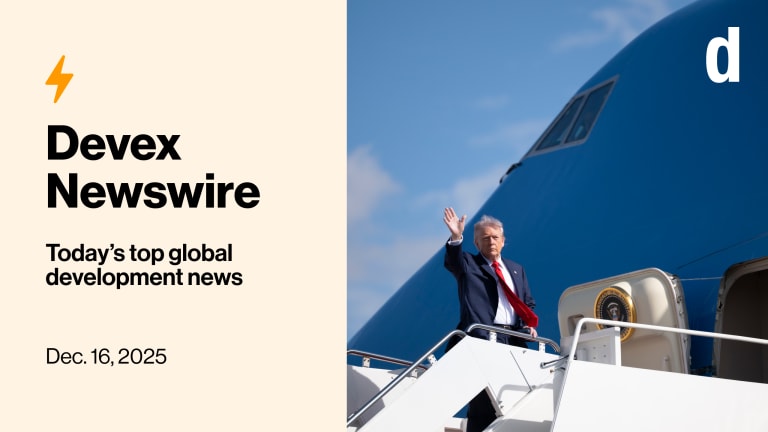
MacKenzie Scott has given away billions of dollars with a focus on organizations led by people — many of them women — who have experienced the structural and humanitarian challenges that Scott’s philanthropy aims to address. Kenya-based NGO Adeso is hoping its $5 million grant can provide a solid foundation for the future.
This is a preview of Newswire
Sign up to this newsletter for an inside look at the biggest stories in global development, in your inbox daily.
Join us today at 1 p.m. ET (7 p.m. CET): If you’re not already planning to be there in person, you can still tune in to the live broadcast of our food systems event A seat at the table. My colleague Teresa Welsh will be discussing the current global food crisis, the implications of climate change, and how the war in Ukraine affects food security. Save your spot.
My colleague Stephanie Beasley followed up with the leader of a humanitarian and development organization to get a clearer picture of what happens when someone in that position gets the phone call from a person representing MacKenzie Scott sharing a trajectory-changing financial donation.
Degan Ali is the director of Adeso and a leading voice for “decolonizing aid,” which Stephanie describes as a “movement, which seeks to decenter the voices of Western decision-makers and shift more power to nonwhite and local leaders in the global south.”
Scott included Adeso in a June 15, 2021 blog post listing the 286 organizations to which she collectively donated more than $2.7 billion in the first half of last year.
Adeso plans to start by using that gift to establish an endowment, which will hopefully grow over time and provide the organization with a sustainable source of income. Stephanie has previously reported on the relative rarity for minority-led and locally led organizations to receive donations in the form of endowments, even though these can be some of the most sustaining and empowering gifts for groups working to create social change.
“We basically said we’re not going to use [Scott’s donation] for operational costs every day, and we’re going to try to turn this and other funds that we get hopefully in the next few years and grow it into a $30 to $50 million endowment. That’s our goal in the next 10 years,” says Ali.
The organization also plans to launch a new online platform for locally led organizations to more easily connect with potential funders, and will create a private company that can take on some of the “back end” work — financial management, audit reports, etc — associated with implementing development projects.
Read: Adeso aims to spin $5M Scott grant into endowment, web platform
French connection
French President Emmanuel Macron was reelected for a second, five-year term on Sunday, facing down a challenge by far-right candidate Marine Le Pen. Macron has overseen a big increase in French foreign aid — and a revamp of the country’s approach to development cooperation. For Devex Pro subscribers — to catch you up on what Macron’s reelection means for France’s role as a major development power, here are two must-read articles — and a video — from Devex’s recent coverage.
From What the French presidential election could mean for development aid: “[Macron] is widely seen as having moved France toward greater multilateral engagement, as well as greater partnership and less paternalism in its relations with its former colonies.”
From The changing face of French aid: A new French aid law, “cements moves that … Macron flagged near the start of his term: increased use of grants, greater bilateral assistance, and more spending channeled through civil society organizations.”
My colleague Vince Chadwick hosted a conversation that included one of the architects of the French aid reforms, Hervé Berville, which Devex Pro subscribers can watch.
Plus, watch out for Devex Money Matters edition Monday as we feature a primer on French aid. Sign up to receive a free copy today.
+ Start your 15-day free trial of Pro today to access exclusive content.
Threat assessment
“We want to encourage a culture of making things public as quickly as possible. If you are hacked, then unless you have the money to respond and to manage it, you remain a sitting duck.”
— Olivia Williams, information security specialistWith reports that "malicious state actors" are targeting humanitarian organizations with cyberattacks, my colleague David Ainsworth speaks to information security expert Olivia Williams about what NGOs can do to mitigate the risk.
One area of concern: the humanitarian sector uses a lot of audio and video files, and isn’t very good at protecting them.
Read: How vulnerable are NGOs to cyberattacks? (Pro)
+ Join our Devex Pro Live event on April 28 at 10 a.m. ET (4 p.m. CET), for David’s in-depth discussion with Williams and other experts on the risks that NGOs face in times of cyberwarfare. Save your spot.
Software update
The World Bank has broadened its approach to digital development.
Catherine Cheney writes: “The World Bank’s digitalization strategy has previously focused on telecom infrastructure and services. But initiatives now cover a wider range of sectors … such as digital skills development, e-commerce, digital identification, and cybersecurity.”
One example is the new Digital Acceleration Project, which is providing $100 million from the International Development Association’s “Scale-Up Window” to support the Rwandan government’s digital transformation plans.
Read: How the World Bank's work on digitalization is evolving
In other news
The World Bank is preparing an aid package for Sri Lanka, as the country struggles amid a political crisis. [Reuters]
This week, U.N chief António Guterres will travel to Russia first, then Ukraine to meet with their respective leaders. [UN News]
An Ebola outbreak has been declared in the Democratic Republic of Congo on Saturday, following a confirmed case in Equateur Province. [WHO]
Sign up to Newswire for an inside look at the biggest stories in global development.








